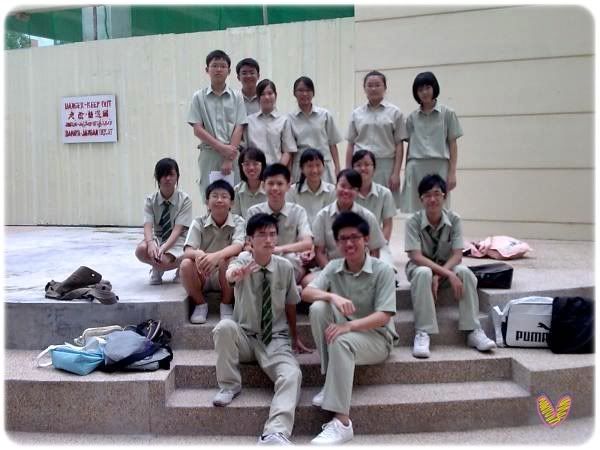 |
||
|
Thursday, April 12, 2007
PAMELA IS BACK! (: miss me? i bet you do (: anw, sec 1s here today! got matthew, jun guang, glenn.. hahah excited not? tricia u dun diu zhongyinsheng de lian ok, cus matthew pro-er than u LOL! no la, joking only. he got more experience than u. hahaha alot more seyz -.- anw, hmm. chocolate cake fight! wahaha. now my shirt is stain-less le! yours leh? anw i just did the quiz. zzz. tricia u watch out.. say i spoil the most no of instruments. haha jkjk. zzz. the guan is accidentally one lor.. cannot have accidents is it? how wld u feel if i keep saying u spoil the most no of instruments when it's accident? ni hao shou ma? hmph. =X mei da mei xiao. (cus i older) ok. yiting say she's gonna bully our jnrs if they... hahaha anw, pam is a nice nice girl she wun bully her jnrs LOL! ppl pls dun rmb my words THANK YOU THANK YOU (: ok la. gtg liao, just wanna keep this gy blog alive for the jnrs to read (: gys shou xi retiring real soon. logistics still here (: ok la. bye PRSS g.y blows at 8:10:00 PM. |
The GUANYUERS
GY CRAVES more bonded♥[unity] GY LINKS
GY CHATTERBOX
Our Instruments Dizi 
Three main types of dizi are frequently used in the wind section: the bangdi, the qudi, and occasionally the koudi. The bangdi is shorter in length and smaller in diameter and produces a clear and bright tone. It is frequently used in bangzi opera of Northern and southern China, hence the name bangdi. The longer and thicker qudi produces a richer and mellower tone. The qudi is usually a fourth higher in pitch than the bangdi. The koudi is the highest-pitched of all dizis.
Sheng


The sheng is a Chinese free-reed bamboo mouth organ. The earliest type ever recorded in history had 14 pipes and was discovered in Zeng Houyi's tomb in Hubei province. The most common types of sheng today include a 17-pipe instrument and a modified version for contemporary compositions, which has an expanded range of 21-37 pipes. The tone of the sheng is lucid and bright. It has a huge range, a chromatically complete scale and is able to produce chord voicings.
Suona
 The tone produced by suona is loud, piercing and uplifting, thus it is usually used to perform vibrant and lively pieces. However, its repertoire also includes some mellower pieces. The suona is commonly used as an accompaniment in the Chinese opera, singing or dancing, but also for more sombre occasions, such as during a traditional Chinese funeral procession. It is also utilised in solos or ensembles for various occasions and ceremonies. | |